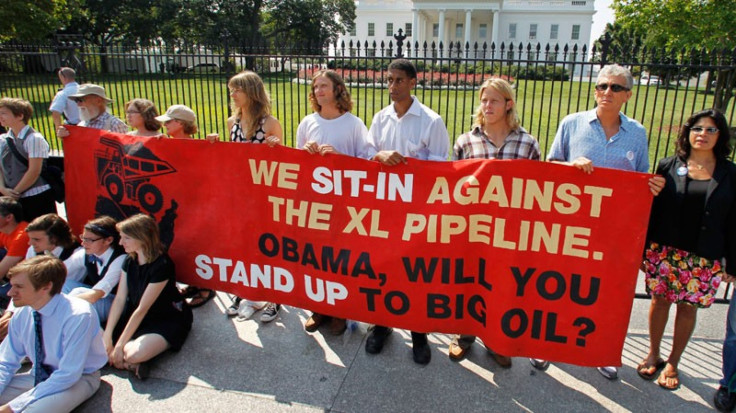Obama Administration to Announce Keystone XL Pipeline Delay

The Obama administration plans to announce that it will push back its decision regarding the contested Keystone XL pipeline while it studies an alternate route for the proposed 1700-mile project, officials and lobbyists who have been briefed on the matter said on Thursday.
The administration, which will reportedly make the announcement as Thursday afternoon, now says the final decision will be made after the 2012 election, a victory for the thousands of environmentalists who have conducted multiple high-profile events protesting the project since August.
A source familiar with the matter told Reuters that analyzing a new route for the pipeline -- which aims to transport about 700,000 barrels of crude sand tar oil from Canada to refineries on the Gulf Coast each day -- will likely take anywhere from 12 to 18 months. In addition, the New York Times reports the administration is expected to announce it will study an alternate route that avoids Nebraska's Sand Hills region and the Ogallala aquifer.
Risk to Critical Ogallala Aquifer
Public officials in Nebraska have opposed the current route, claiming it could contaminate the Ogallala aquifer, which provides drinking and irrigation water for about 80 percent of the state. Gov. David Heineman has publicly reached out to the Obama administration, asking them to consider a pipeline route on the east side of the state that would bypass the aquifer.
TransCanada, the developer of the $7 billion pipeline, has previously said it would be impossible to change the route of the pipeline at this point.
The route that has been selected is the most environmentally responsible and has the least impact to the land the pipeline will go through, TransCanada spokesman Terry Cunha told Bloomberg Business Week.
However, the U.S. Environmental Protection Agency has questioned the ecological impact of the pipeline, saying the U.S. State Department needs to conduct further research on its potential impact on groundwater and air pollution.
Critics also claim the tar sands oil extracted in Canada will increase fossil fuel emission, as well as U.S. dependence on fossil fuels, when it should be focusing of renewable energy.
Last week, the State Department's Office of the Inspector General announced it has launched a special investigation into the Keystone XL approval process, in response to reports that the government's initial review -- which deemed the pipeline would have a minimal environmental impact -- was prejudiced by bias and conflicts of interest.
During a campaign stop in Nebraska last week, President Barack Obama indicated that he, not the State Department, would make the final decision on the pipeline based on what is best for the American people.
What's best for our economy both short term and long term? But also what's best for the health of the American people? Obama said. I think folks in Nebraska like all across the country aren't going to say to themselves, 'We'll take a few thousand jobs' if it means that our kids are potentially drinking water that would damage their health or if rich land that's so important to agriculture in Nebraska ends up being adversely affected.'
© Copyright IBTimes 2025. All rights reserved.





















